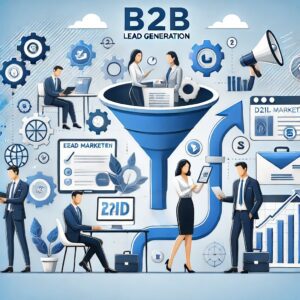
Mastering Lead Generation for B2B: Strategies and Best Practices
Lead generation is the lifeblood of any successful B2B business. Without a steady stream of qualified leads, it's challenging to sustain growth and achieve long-term success. This blog post delves into the essential strategies and best practices for effective lead generation in the B2B space.
Understanding B2B Lead Generation
Lead generation in B2B involves attracting and converting potential customers (or leads) into interested prospects who may eventually become paying clients. Unlike B2C, where the decision-making process is often quick and driven by individual preferences, B2B lead generation typically involves a longer sales cycle and multiple decision-makers.
Key Strategies for B2B Lead Generation
1. Content Marketing
Content is king, especially in the B2B landscape. By creating valuable and informative content, you can attract potential leads and establish your business as a thought leader in your industry.
- Blog Posts: Regularly publish blog posts that address common pain points, industry trends, and solutions relevant to your target audience.
- Whitepapers and eBooks: Offer in-depth insights and research in exchange for contact information.
- Webinars and Podcasts: Host webinars and podcasts to engage with your audience and showcase your expertise.
2. Search Engine Optimization (SEO)
Optimizing your website for search engines is crucial for attracting organic traffic and generating leads. Focus on the following:
- Keyword Research: Identify and target high-intent keywords relevant to your industry, such as "lead generation B2B."
- On-Page SEO: Optimize your website's content, meta tags, and headings to improve search engine rankings.
- Link Building: Acquire high-quality backlinks from reputable sources to boost your website's authority.
3. Social Media Marketing
Social media platforms are powerful tools for B2B lead generation. Use these platforms to share content, engage with your audience, and generate leads.
- LinkedIn: Leverage LinkedIn's professional network to connect with potential leads, join industry groups, and share valuable content.
- Twitter: Use Twitter to share industry news, participate in relevant conversations, and connect with influencers.
- Facebook: Create a business page and use targeted ads to reach your ideal audience.
4. Email Marketing
Email marketing remains one of the most effective B2B lead generation strategies. Build and nurture relationships with potential leads through personalized and relevant email campaigns.
- Lead Magnets: Offer valuable resources such as free trials, demos, or downloadable content in exchange for email addresses.
- Segmentation: Segment your email list based on criteria such as industry, job role, and engagement level to deliver tailored content.
- Automated Drip Campaigns: Set up automated email sequences to nurture leads and guide them through the sales funnel.
5. Paid Advertising
Investing in paid advertising can significantly boost your lead generation efforts by reaching a broader audience quickly.
- Google Ads: Use Google Ads to target high-intent keywords and drive traffic to your landing pages.
- LinkedIn Ads: Create targeted ads on LinkedIn to reach decision-makers and professionals in your industry.
- Display Ads: Use display ads to increase brand awareness and retarget visitors who have previously engaged with your website.
6. Networking and Events
Attending industry events, conferences, and networking meetups can help you connect with potential leads in person.
- Trade Shows and Conferences: Participate in trade shows and conferences to showcase your products/services and generate leads.
- Webinars and Virtual Events: Host your own webinars and virtual events to reach a wider audience and generate leads online.
Best Practices for B2B Lead Generation
1. Understand Your Target Audience
Before implementing any lead generation strategy, it's essential to understand your target audience. Develop detailed buyer personas that include information about their demographics, pain points, and decision-making processes.
2. Optimize Your Website for Conversions
Your website should be designed to convert visitors into leads. Ensure your landing pages are optimized with clear calls-to-action (CTAs), user-friendly forms, and compelling copy.
3. Track and Analyze Performance
Use analytics tools to track the performance of your lead generation efforts. Monitor key metrics such as website traffic, conversion rates, and lead quality to identify areas for improvement.
4. Align Sales and Marketing
Ensure your sales and marketing teams are aligned and working towards common goals. Regular communication and collaboration between these teams can lead to more effective lead generation and conversion strategies.
5. Continuously Improve and Adapt
The B2B landscape is constantly evolving, and so should your lead generation strategies. Continuously test, analyze, and adapt your strategies to stay ahead of the competition and meet the changing needs of your target audience.
Conclusion
Effective lead generation is critical for the success of any B2B business. By implementing the strategies and best practices outlined in this blog post, you can attract and convert high-quality leads, ultimately driving growth and achieving your business goals.
For more insights and personalized strategies on B2B lead generation, consider booking a free strategy call with MyGrowthHack. Together, we can unlock your business's full potential and pave the way for sustained growth.


